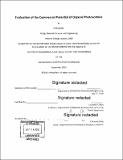Evaluation of the commercial potential of organic photovoltaics
Author(s)
Ren, Jinfeng.
Download1126335183-MIT.pdf (21.42Mb)
Other Contributors
Massachusetts Institute of Technology. Department of Materials Science and Engineering.
Advisor
Caroline A. Ross.
Terms of use
Metadata
Show full item recordAbstract
Recent years saw a steady increase in the record efficiencies achieved by organic photovoltaics. These have stimulated further interests and pursuit among the enthusiasts, in terms of both academic research and commercialization efforts. Indeed, organic photovoltaics offer a wide range of unique advantages, such as mechanical flexibility, being light-weight, and can be dyed in different colors. Above, it can be mass produced using roll-to-roll printing methods and offers ultra-low production costs. However, organic photovoltaics face other great challenges, which need to be overcome before they can truly compete with other thin-film photovoltaic technologies. Organic photovoltaics have very low module efficiency and short lifetime, as compared to inorganic photovoltaics. This thesis provides a survey of current research efforts in addressing these problems. A survey of the current photovoltaic market, including thin-film photovoltaics, is also provided. A detailed cost model is proposed to see if the ultra-low cost of organic photovoltaics can compensate for their low efficiency and short lifetime.
Description
Thesis: M. Eng., Massachusetts Institute of Technology, Department of Materials Science and Engineering, 2010 Cataloged from PDF version of thesis. Includes bibliographical references (pages 89-92).
Date issued
2010Department
Massachusetts Institute of Technology. Department of Materials Science and EngineeringPublisher
Massachusetts Institute of Technology
Keywords
Materials Science and Engineering.